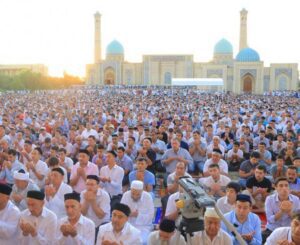
Nearly a billion Muslims in the world are celebrating Wednesday the main Islamic holiday, the Day of Sacrifice, also known as Eid al-Fitr and Eid al-Adha.
Any Muslim who can afford it must sacrifice an animal, and one person can limit himself to a sheep, but for a group of up to ten adherents of Islam one cattle is enough. The animal should be rather young and without any physical defects. Two thirds of meat of a sacrifice should be given to poor people, and the rest goes to a festive meal of a family.
The sacrifice is performed by Muslims in memory of the Prophet Ibrahim’s readiness to sacrifice his son Ishmael to the Most High to prove his loyalty to God. However, the Almighty, having tested Ibrahim, stopped his hand over his son and sent him a white lamb to be sacrificed.
During Eid al-Adha, it is customary to wear new or at least better clothes, to go visiting, to give gifts, and to visit the graves of loved ones.
In Saudi Arabia, the Festival of Sacrifice is the culmination of the hajj, the annual pilgrimage of Muslims to the shrines of Mecca and Medina. About 2.5 million worshippers gathered there this year, 2.5 times more than last year, when the world was still reeling from the pandemic and related health and visa restrictions.

Almost a billion Muslims of the world celebrate this Saturday the main Islamic holiday – the Day of Sacrifice, also known as Eid al-Adha and Eid al-Adha.
Every Muslim who has the means to do so is obliged to sacrifice an animal, and one person can be limited to a sheep, and one head of cattle is enough for a group of up to ten adherents of Islam. In this case, the animal must be quite young and without physical defects. Two-thirds of the meat should be distributed to the poor, the rest goes to the festive meal of the family.
The sacrifice is made by Muslims in memory of how the prophet Ibrahim was ready to sacrifice his son Ismail to the Almighty in order to prove devotion to God. However, the Almighty, having tested Ibrahim, stopped the hand raised above his son and sent Ibrahim a white lamb, which was sacrificed.
During the days of Eid al-Adha, it is customary to wear new or at least better clothes, go to visit, give gifts and visit the graves of loved ones.